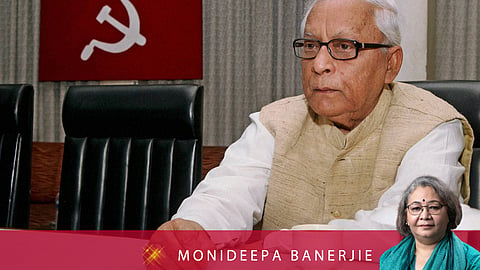

A Marxist and a gentleman with a poet's soul. Buddhadeb Bhattacharjee would probably not be entirely unhappy with this epitaph. If he wanted to tweak it a little, it would probably be to add half a sentence to the one above: a Marxist and a gentleman with a poet's soul. And big dreams.
The Bangali Bhadralok in his spotless white dhuti-panjabi passed way at his two-room flat in south Kolkata this morning. He had turned 80 on March 1.
Buddhadeb Bhattacharya was a diminutive man, barely five foot four. But he was a tall leader who dreamt big dreams of a resurgent West Bengal, dreams he convinced people would come true in those 10 years he led the state from -- the years 2000 to 2011. Of a West Bengal where a strong foundation in agriculture would be a firm base for a booming industry, all of it achievable with hard work and that rare quality of which he was and will always remain an icon: absolute personal honesty.
He could not deliver and it is still too early to decisively judge why but history will most likely judge him kindly, if not for delivery, certainly intent.
In November of 2000, Jyoti Basu resigned as Chief Minister of West Bengal after 23 years and the spotlight turned on Buddhadeb Bhattacharjee who was earlier home minister and before that minister for information and culture, a role he revelled in, talking at length about cinema and books and poetry and theatre that inspired him.
As Chief Minister, he was often at the state government's cultural complex, Nandan, watching rare films that obliging officials acquired for his favourite project, the Kolkata International Film Festival.
One of his favourite excuses for his time out was, man does not live by bread alone. That even a hungry man sings.
But celluloid was no escape from real life and Buddhadeb quickly spelt out his big picture for West Bengal in three words: industry, industry, industry. His mantra was: perform or perish. He even risked the wrath of his party, the CPI-M, and its trade union wing, CITU, when he slammed the practice of militant trade unionism that had forced industry to flee from West Bengal in the past and continued to plague the few that stayed on.
In no time, he became the poster boy for a new-look CPI-M.
Comrade Buddha became Brand Buddha.
After a dramatic election victory in 2006, on the very day he was sworn in Chief Minister, he joined Ratan Tata at a press conference at his office to announce the setting up of an automobile factory 40 km from Kolkata, at Singur.
Those were heady days. Young people spoke of the hope of getting jobs in their home state and not being forced to migrate in search of work. But the euphoria was all short-lived. Less than three years later, in October 2008, Ratan Tata shut shop in Singur, leaving behind a graveyard of mangled metal just off a highway out of Kolkata, the carcass of the car factory with which Buddhadeb had hoped to change the course of West Bengal's future.
Much water had flown under the bridge by that time. Nandigram had happened. Buddhadeb Bhattacharjee had wanted to set up a chemical hub there, one that would provide hundreds of jobs to locals but ended up with the slur of ordering police firing there that left 14 people dead on March 14, 2007.
The violence that followed subsequently was without precedent. Desperate to retain the fast-slipping narrative in the state, the CPI-M tried strongarm tactics. Buddhadeb justified the use of force saying 'they have been paid back in their own coin'. The 'they' in that statement was the opposition Trinamool Congress and allegedly Maoists whom he blamed for fomenting violence. But no one was listening. The powerful civil society in Kolkata turned away from the brute force used.
Then the Maoists struck in Lalgarh, almost blowing up Buddhadeb's vehicle as he was returning to Kolkata after inaugurating a steel plant in the area plunging the state into yet another destructive and disruptive turmoil.
There are many who have said that Buddhadeb Bhattacharjee's handling of the crises was too soft. Had he taken strong action against the opposition during the Singur agitation, had he deployed police to disperse the then opposition leader Mamata Banerjee's dharna outside the Singur factory, completely blocking a national highway for weeks, his story would have panned out differently.
But that is hindsight which may or may not always be 20:20.
The juggernaut of Buddhadeb's political trajectory rolled relentlessly on into electoral setbacks one after the other -- in the panchayat elections of 2008 and then the Parliamentary polls of 2009. The final debacle came in 2011 when not only did the CPI-M lose West Bengal, but Buddhadeb Bhattacharjee also had to suffer the personal ignominy of losing from his own Assembly seat of Jadavpur in south Kolkata.
Yet, far from being dismissed as a failed Chief Minister, Buddhadeb Bhattacharjee for many people has remained an inspiring icon of personal probity and honesty and for showing the state of West Bengal what it could become. In one of his infrequent travels abroad to woo industry, Buddhadeb would speak of a slogan that matched his aspirations for the state: it was 'Believe in Bengal'.
Even today, no one in Bengal can quarrel with that slogan or with the man who believed in it.